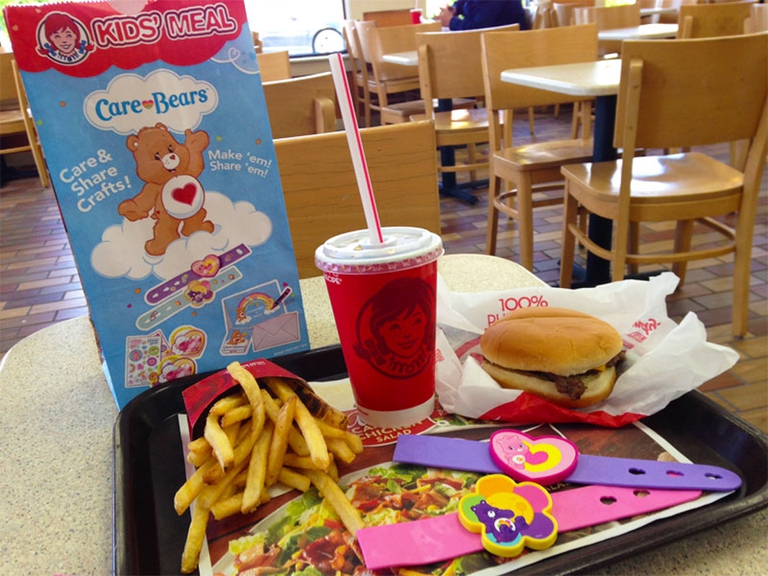
Factory farming conditions and antibiotic-resistant pathogens emerging as a result of them pose an existential threat to humans in the form of zoonotic diseases. Why it’s time to produce and consume food more thoughtfully.
The country’s new anti-obesity regulations ban commercials advertising junk food and prohibit unhealthy meals aimed at children from offering free toys.
Beginning on 1st January 2016 Tawain bans TV commercials advertising unhealthy food, inappropriate for children. From 5 to 9 p.m. every day no more spots advertising junk food, snacks rich in fats and sugars, sweet drinks or sodas but even all those food products attracting kids with free toys are aired on TV channels. This is a widespread marketing strategy in fast-food chains, according to the Food and Drug Administration.
“Snacks, candies, beverages, frozen treats and fast-food that contain trans fats, saturated fats, sodium or added sugar exceeding regulation standards will be targeted by the new regulation”, the FDA said in a note. The restriction is limited to the channels targeted to children, not to the other channels, such as news channels.
Taiwan is facing a period when childhood obesity represents a major issue: an international team found that among the 59 countries analysed, Taiwan ranked 16th in terms of obesity with 27% of the students being overweight. A survey of the Child Welfare League Foundation revealed that children saw an average of over 8,000 junk food ads yearly, with interruptions every six minutes during the most popular cartoons. In addition, the frequency of such commercials during meal times is 1.6 times higher than in any other moment.
Consumers can complain about any violation of the current regulations by calling the free-phone number 1919. Perpetrators will be sanctioned with fines ranging from 1,000 to 11 thousand euro.
Siamo anche su WhatsApp. Segui il canale ufficiale LifeGate per restare aggiornata, aggiornato sulle ultime notizie e sulle nostre attività.
![]()
Quest'opera è distribuita con Licenza Creative Commons Attribuzione - Non commerciale - Non opere derivate 4.0 Internazionale.
Factory farming conditions and antibiotic-resistant pathogens emerging as a result of them pose an existential threat to humans in the form of zoonotic diseases. Why it’s time to produce and consume food more thoughtfully.
The world of cinema recognises the link between food choices and the climate crisis by offering vegan menus for awards season events, including at the most important of them all: the Oscars.
Obesity is a worldwide widespread disease. Such condition occurs when the intake of calories exceeds the amount of calories burnt. Obesity is due by poor nutrional education, sedentary lifestyle and other causes, such as genetic predisposition, family environment and social and economic conditions. Obese or overweight children do not necessarily eat too much, but they
Let’s look at the reasons behind the growth of veganism in India, as a small yet vocal section of the population turns towards this diet and lifestyle in the largest milk producing country in the world.
by Jeffrey Y. Campbell, Manager of the Forest and Farm Facility at FAO In the Ecuadorian Amazon, Kichwa farmers grow dozens of products on tiny parcels of land. Their lands hum with biodiversity, yielding nutritious foods that have sustained families for generations. Wandering among fruit and nut trees and crops, these indigenous agroforesters fill their baskets
Mint has many health benefits, but in food it’s often accompanied by artificial green colourings. Instead, Galatea has created a green mint ice cream in a completely natural way.
We’re talking about Galatea, a company that produces semi-finished products for artisanal ice creams using high quality ingredients, natural colouring, excluding thickeners and hydrogenated fats, respecting the environment and supporting the less fortunate.
The mad rush to fake food, like fake meat made with genetically-modified soy, ignores the importance of the diversity of our foods and culinary cultures. It’s a recipe to accelerate the destruction of the Planet and our health.
Like with all foods, the quality of an ice cream can be discerned by reading its label. An expert explains how to do this, and tells us how their company steers clear of chemicals, using only natural ingredients to produce an excellent and “free” ice cream.









